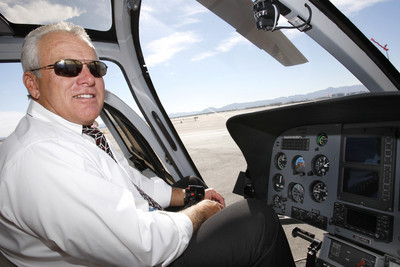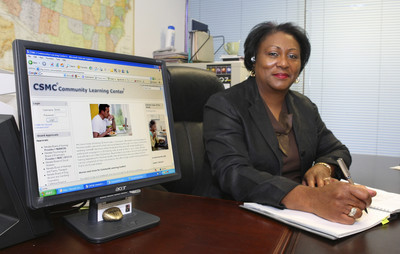SMALL BUSINESSES FEEL CASH CRUNCH
Ten years ago, Greg Rochna had no problem getting a $10 million loan from a German bank to buy helicopters for the family business, Maverick Helicopters of Las Vegas.
Getting a much smaller loan from Wells Fargo Bank in Las Vegas to buy a van for the then-two-year-old business proved impossible, though.
Panch Prasad, chief executive officer of Las Vegas-based U.S. International Trading Corp., has had his problems with banks, too.
Even after the Bank of the West encouraged him to apply for a loan a few years ago, his request for a $300,000 line of credit was rejected for being too small.
Linda Branch, owner of CSMConsultants of Las Vegas, sought loans from two banks when she was establishing her Las Vegas executive coaching and staff development business in 2004. One bank rejected her when she called. A second bank took her loan application but never responded.
"I don't even think the loan officer reviewed the application," Branch said.
All three business owners eventually found lenders willing to help them, but their experiences as owners of startup and relatively new businesses are common.
Some analysts now fear it will get even harder for small businesses to obtain loans as banks start tightening lending standards because of the developing credit crunch in residential home mortgages and commercial paper.
So far, Cheryl Blomstrom, state director of the National Federation of Independent Business, hasn't heard any complaints about credit availability from her 1,700 Nevada members. But she expects banks to impose tougher lending standards for loans and commercial paper, or short-term, unsecured obligations issued by banks and large corporations.
That's a change from just a couple of years ago, when credit standards for business loans were relatively loose because of the economic boom times.
"A lot of small businesses are in business today because lenders were willing to take a risk," Blomstrom said.
Stuart Olson, president of Service1st bank, is one of those who agree that banks will become more careful about underwriting loans if the economy continues to decline.
"There is going to be some deterioration in bank loan portfolios if this continues," Olson said.
That seems likely to happen, too.
John Scott, SBA's Nevada district director, said: "A number of national economists now are projecting a good possibility of a recession in 2008."
Ed Brown, SBA's chief of finance in Nevada, also sees signs of growing economic weakness in the federal agency's numbers for Nevada.
Although the number of loans has stayed fairly steady, the amounts of those loans are shrinking because small business owners have less equity in their homes, which they often have to pledge to qualify for SBA loans.
"(The number of SBA loans) is flattening out," Brown said. "It's not growing at the same exponential growth factor. The average size of the loan is declining."
With less than one month left in the fiscal year, the Nevada Small Business Administration counts 1,121 SBA loans for $261 million in Nevada. That compares with 1,112 loans for $271 million at the end of the last fiscal year.
Silver State Bank of Henderson ranks fourth in the number of SBA loans in Nevada, and the bank's president, Calvin Regan, said his financial institution hasn't changed its credit standards for the commercial paper and loan market.
"Our demand is still pretty strong (for small business loans)," Regan said.
Demand for SBA section 7(a) loans, however, dropped when the prime interest rate offered to the best commercial borrowers hit 8.25 percent in June 2006, Regan said. SBA 7(a) loans offer variable interest rates and a government guarantee to repay part of the loans.
Meanwhile, Regan said, the SBA 504 loan program, which provides long-term, fixed-rate financing, typically for buildings and equipment, has become more popular.
New businesses, in particular, could have a harder time landing money than established ones.
Janis Stevenson of the Nevada Small Business Development Center said banks typically are reluctant to make loans to businesses that are under two years old.
Rochna, president of Maverick Helicopters, said he was stunned when Wells Fargo turned him down for his van loan, especially after he already successfully took out the $10 million loan.
"They turned us down because we didn't fit the mold," Rochna said.
In fact, he said Tod Little, then CEO at Silver State Bank, had once owned a half interest in a helicopter service and was ready to lend money to Maverick for the helicopter purchases.
"They gave us a line of credit and said we didn't have to go to Germany to finance helicopters," Rochna said. "Without the SBA loans, to be perfectly honest, we wouldn't have made it."
Prasad, an exporter of cosmetics and hair-care products for 17 years, had a different experience when he tried to get a Las Vegas bank to provide financing needed to expand his international trade business.
Prasad received an unsolicited call from an SBA loan broker offering to prepare the loan application for $2,600. But Prasad rejected the offer and completed the application without outside assistance.
SBA loan brokers can be useful helping businesses prepare applications and find an SBA lender, said the SBA's Scott. The fee typically runs $1,000 to $1,500, Brown said.
Prasad, an exporter of cosmetics and hair-care products for 17 years, turned to GBC International Bank, an SBA lender in Monterey, Calif., who was familiar with the export business. GBC provided Prasad with a $500,000 line of credit.
"The key is you've got to apply to the right bank," Prasad concluded.
Although some businesspeople swear by independent banks, some of the biggest SBA lenders are large regional banks. Bank of America, Wells Fargo and U.S. Bank were the top producers of SBA loans in Nevada this year.
Bank of America identified Sean Cook, owner of Global Food, as a typical small-business borrower. His company distributes food to school districts, prisons, food banks and government clients around the country.
He started the business in 1996 using home equity to get a $100,000 line of credit. Since then, he has applied to Bank of America and received business loans. He attributes his success in getting loans to his long-time relationship with the bank.
"We've been through good times, and we've been through tough times," Cook said, "and (Bank of America has) been there to help us in both times."
For small mom-and-pop businesses or sole proprietorships, the best option for loans may be the Nevada Microenterprise Intitiative.
"We're the only game in town, especially for people who have bad credit and don't have enough money to put down," Executive Director Deborah Proutt said.
The initiative makes loans ranging from $3,000 to $35,000, or those too small to be of interest to most banks. Rates on the group's loans run 12 percent.
In addition to loans, the initiative offers 12-week training sessions for entrepreneurs that will give participants an idea of what kind of profits their proposed business might generate.
"They really end up doing cash flow analysis," Proutt said.
Initiative clients have started businesses ranging from massage therapy practices, long-haul trucking companies, mobile car washes, janitorial services, carpet laying companies and small restaurants.
During the first eight months of the year, the initiative made 36 loans for $440,000.
Unlike the SBA program, loan availability is governed by how much funds it gets each year from the federal government, not the willingness of banks to make such loans. Proutt counts $1.3 million in loans outstanding through the program, which started in 1991.
Branch borrowed $10,000 from the initiative to start her business in 2004 after two banks snubbed her. The nonprofit organization made a second loan for $35,000 a year later. She provides leadership and management development advice to businesses and also offers continuing educational programs to health care workers through the Internet.
Women business owners have a tougher time than men in getting loans, said Gina Robison-Billups, the founder and president of the Henderson-based Moms In Business Network.
"The perception is that moms in business are selling makeup and skin care," Robison-Billups said. "I think it's changing."
Network members include the owner of a casino, graphic designers, interior designers and retailers.
Many women use personal credit cards to finance startup businesses.
"It's not the smartest way to go," she said.
Instead, she said, women in business should try the Nevada Microenterprise Initiative.
This story first appeared in the Business Press. John G. Edwards writes for the Business Press' sister publication, the Las Vegas Review-Journal. He can be reached at 383-0420 or at jgedwards@review journal.com.



















